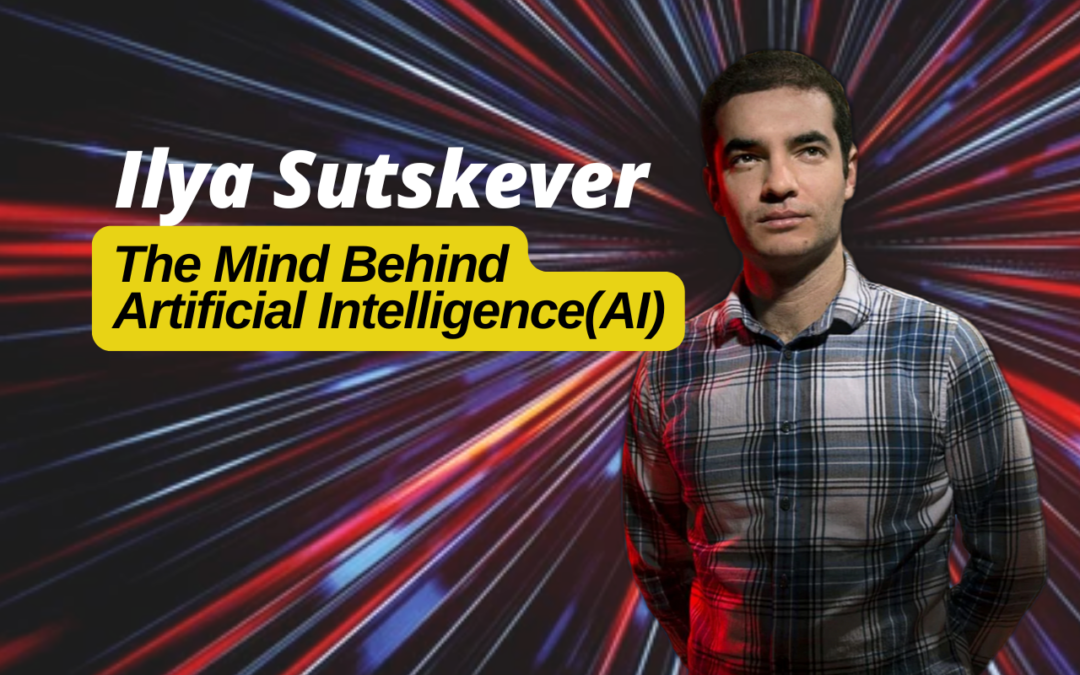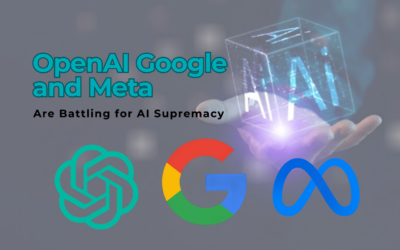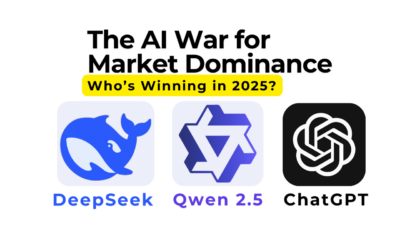How One Computer Scientist Is Shaping the AI Landscape and What It Means for Your Business
Artificial Intelligence (AI) has transitioned from a niche academic field to a transformative force reshaping industries, economies, and daily life. At the forefront of this revolution is Ilya Sutskever, a computer scientist whose groundbreaking contributions have redefined the boundaries of machine learning and AI capabilities. As the co-founder and Chief Scientist of OpenAI, Sutskever has played a pivotal role in advancing technologies like GPT (Generative Pre-trained Transformers), which underpin applications such as ChatGPT and DALL·E.
This article delves into Sutskever’s journey, his monumental impact on the AI landscape, and the strategic implications of his work for businesses navigating an AI-driven future.
Ilya Sutskever: A Visionary in AI
Born in Russia and raised in Canada, Ilya Sutskever displayed an early aptitude for mathematics and problem-solving. He pursued computer science at the University of Toronto, where he earned his Ph.D. under the mentorship of Geoffrey Hinton, often regarded as one of the “godfathers of AI.”
During his doctoral studies, Sutskever co-authored AlexNet, a deep learning model that revolutionized computer vision and won the 2012 ImageNet competition. This breakthrough marked a turning point for neural networks, establishing their potential to outperform traditional methods in tasks like image recognition.
Sutskever’s academic prowess and visionary approach caught the attention of major players in the tech industry, including Google. He joined the Google Brain team and contributed to numerous advancements in machine learning before co-founding OpenAI in 2015 with Elon Musk, Sam Altman, Greg Brockman, and others.
OpenAI: Democratizing and Safeguarding AI
OpenAI was founded with a mission to ensure that artificial general intelligence (AGI)—AI systems that surpass human cognitive capabilities—is developed safely and benefits all of humanity. Unlike many AI initiatives driven by profit motives, OpenAI’s approach emphasizes ethical considerations and long-term societal impact.
Under Sutskever’s leadership, OpenAI has achieved several milestones, including:
- GPT Models: The release of GPT-2, GPT-3, and GPT-4 demonstrated the power of large language models (LLMs) in understanding and generating human-like text. These models have become foundational in applications like content creation, customer support, and even software development.
- DALL·E: This AI model generates stunning images from textual descriptions, revolutionizing fields like marketing, design, and entertainment.
- Reinforcement Learning: OpenAI has pioneered advancements in reinforcement learning, as seen in their success with AI systems like OpenAI Five, which defeated human champions in the video game Dota 2.
Ilya Sutskever’s Vision for AI
Ilya Sutskever is a strong advocate for the responsible development of AI. He believes that while AI holds immense promise, it also presents significant risks if misused or left unchecked. In interviews, he has emphasized the need for:
- Transparency in AI Development
- OpenAI’s decision to release GPT models cautiously reflects this philosophy. For instance, GPT-2’s full release was delayed due to concerns about misuse.
- Collaboration Across Stakeholders
- Sutskever supports partnerships between governments, academia, and private companies to create policies that guide AI development responsibly.
- Long-Term Focus
- While the business world often prioritizes short-term gains, Sutskever’s approach underscores the importance of preparing for AGI’s profound societal implications.
The Business Implications of Sutskever’s Work
Ilya Sutskever contributions to AI are not just academic or theoretical—they are reshaping how businesses operate, innovate, and compete. Here are some key takeaways for businesses looking to leverage AI effectively:
1. Automation and Productivity Gains
AI tools powered by models like GPT are automating tasks across industries:
- Customer Support: Chatbots like ChatGPT are reducing response times and enhancing customer satisfaction.
- Content Creation: AI is generating marketing copy, social media posts, and even entire articles, saving time and resources.
- Data Analysis: Businesses are using AI to identify trends and make data-driven decisions faster than ever.
Stat: According to a PwC report, AI could contribute up to $15.7 trillion to the global economy by 2030, with productivity gains being a major driver.
2. Innovation in Products and Services
AI isn’t just improving existing processes—it’s enabling entirely new products and services.
- Personalized Experiences: AI-powered recommendation systems (e.g., Netflix, Spotify) offer tailored experiences that drive customer engagement.
- Design and Creativity: Tools like DALL·E allow designers to create visual content faster, transforming industries like fashion, advertising, and gaming.
- Healthcare Applications: AI is aiding in diagnostics, drug discovery, and personalized treatment plans.
Example: Pfizer leveraged AI to accelerate vaccine development during the COVID-19 pandemic, significantly reducing the time from research to market.
3. Redefining Workforce Dynamics
The integration of AI into business operations will inevitably change workforce structures. While some fear job displacement, Sutskever views AI as a tool for augmenting human capabilities rather than replacing them.
- Upskilling Opportunities: Businesses must invest in reskilling employees to work alongside AI systems effectively.
- Stat: The World Economic Forum predicts that 97 million new roles related to AI and automation will emerge by 2025.
- Ethical Considerations: Companies must navigate challenges around data privacy, algorithmic bias, and transparency to maintain trust with employees and customers.
4. Competitive Advantage Through Early Adoption
Companies that embrace AI early often gain a significant edge over competitors.
- Example: Amazon’s use of AI for inventory management, dynamic pricing, and delivery logistics has set industry standards for efficiency and customer satisfaction.
To capitalize on AI’s potential, businesses must adopt a proactive mindset, staying informed about the latest advancements and integrating them strategically.
Challenges and Risks in the AI Era
While Sutskever’s innovations promise immense opportunities, they also come with risks that businesses must address:
- Ethical Dilemmas
- AI systems can perpetuate biases present in training data. Businesses must implement robust review mechanisms to ensure fairness and inclusivity.
- Cybersecurity Threats
- As AI becomes more integrated, the risk of cyberattacks targeting these systems grows.
- Stat: Cybersecurity Ventures estimates that cybercrime damages could reach $10.5 trillion annually by 2025.
- Regulatory Uncertainty
- Governments worldwide are grappling with how to regulate AI effectively. Businesses must stay abreast of evolving policies to ensure compliance.
The Future of AI: What Lies Ahead?
Looking forward, Ilya Sutskever envisions a world where AI systems become even more powerful and integrated into daily life. Key trends include:
- Advancements in AGI: While still years away, AGI has the potential to solve complex global challenges, from climate change to disease eradication.
- Increased AI Accessibility: As AI tools become more user-friendly, businesses of all sizes will have access to capabilities once reserved for tech giants.
- AI-Human Collaboration: The focus will shift from replacing human effort to enhancing it, fostering innovation and creativity.
Lessons for Business Leaders
Ilya Sutskever journey offers valuable insights for business leaders navigating the AI landscape:
- Invest in Innovation: Stay ahead by adopting emerging technologies and fostering a culture of experimentation.
- Prioritize Ethics: Build trust by implementing AI solutions responsibly and transparently.
- Focus on Long-Term Goals: Align AI initiatives with strategic objectives rather than short-term gains.
Conclusion
Ilya Sutskever work at OpenAI represents a paradigm shift in how businesses approach AI. His contributions have not only advanced the field technically but also sparked vital conversations about the ethical and societal implications of this transformative technology.
For businesses, the message is clear: AI is no longer a luxury—it’s a necessity. By understanding and leveraging the innovations spearheaded by visionaries like Sutskever, organizations can unlock new levels of efficiency, creativity, and competitive advantage while contributing to a future where AI benefits everyone.
The time to act is now. The question isn’t whether your business will adopt AI but how well it will adapt to the opportunities and challenges it presents.












